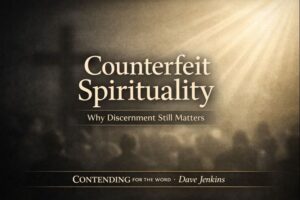⏱️ Estimated Reading Time: 5 min read
One of the quintessential issues in the Church today is the issue of sanctification, specifically assurance. Many Christians struggle their entire Christian lives with knowing whether they are saved and continually feel the need to “accept” Jesus into their hearts. Still others wrestle with a variety of issues such as besetting sins which lead them to question their assurance. Thankfully a new book Gospel Assurance and Warnings by Paul Washer has come out that seeks to help Christians understand the foundation for the Christians assurance and to examine themselves in light of Scriptures teaching.
The bulk of Washer’s book examines 1st John. The book of 1st John Washer rightly notes contains a great deal of teaching on how the Christian can have assurance of their salvation. As Washer draws out the teaching of 1st John, he does so with a view to point Christians to the truth of the gospel contained in the Apostle John’s teaching. 1 John is a very important book for a number of reasons but as Washer shows, it is important especially at this point because it helps Christians to have a standard to examine themselves to see if they have evidence from God’s Word that they have been born again.
Often times examining oneself to see if they are in the faith is taken as some sort of call to be morbidly introspective. Rather than this call, the call to examine oneself to see if they are in the faith is actually a call to provoke the true Christian to love and good deeds. Washer surgically takes up his scalpel called the Word of God and rightly applies the gospel’s cure in the sufficiency of Christ. Christians who struggle with assurance of salvation need to hear the message of the supremacy and sufficiency of Jesus Christ in and over all things. This is the message of the Epistle of Hebrews with its message of the sufficiency of Jesus. In Washer’s able and gospel-guided hands, he helps the reader not only understand what the Apostle John teaches, but also what the Bible declares about the foundation for the Christian’s assurance.
While part one of this book is excellent, part two may be even better. Here Washer takes the reader into Matthew 7 engaging some of Jesus’ hardest teaching. Here the Christian will be challenged to see that it is not anything they do that merits their salvation. As Washer sweeps away self-righteousness and much more, the reader is once again shown what Jesus is really teaching. The one surprising part of this book is the author never considered at length the warning passages in Hebrew. While I understand the difficulty of the passages in Hebrews having spent more than a year studying it personally as well in seminary, this surprised me. After reflecting on this though, I agree with how Washer handled this topic, choosing instead to go directly to Jesus’ difficult teaching on this subject. Salvation is by grace alone in Christ alone but the work of grace should compel the Christian to do good works. When one understands there is no quandary between the teaching of Jesus, Paul and James on this topic, they will begin to better understand how justification flows into sanctification and how the Christian life as Martin Luther once said is one of ongoing repentance.
The warning passages in Jesus’ teaching and in Hebrews are meant to stir the Christian to examine oneself in light of the gospel. While many teachers throughout the history of the Church have gotten this wrong, the Reformers who followed the teaching of Scripture were not. As Washer explores this topic, he follows the teaching of Scripture and the Reformers very closely with a view to help the reader seriously consider what evidence they have for calling themselves a Christian. In a culture where easy-believism is all the rage, there needs to be balance. Washer, in his book Gospel Assurance and Warnings has masterfully struck the balance of Scripture, pastoral reflection, and the teaching of the Church throughout her history.
While the issue of assurance won’t go away anytime soon, Gospel Assurance and Warning by Paul Washer is an important book. It’s important because it challenges Christians right where we need to be challenged, namely with the gospel of the Lord Jesus Christ. While the warning passages in the New Testament are often neutered, Washer brings them alive with biblical and pastoral insight. The warning passages in Hebrews and other challenging passages in the New Testament ought to increase the assurance of the Christian’s salvation. Such passages cause the Christian to reflect on the work of God’s grace in their lives through the work of the Holy Spirit. I highly recommend this book and pray the Lord uses it to awaken a slumbering and apathetic generation to the glory and excellencies of the gospel, including its warnings, for His glory.
I received this book for free from Reformation Heritage Books via Cross Focused Reviews for this review. I was not required to write a positive review. The opinions I have expressed are my own. I am disclosing this in accordance with the Federal Trade Commission’s 16 CFR, Part 255 : “Guides Concerning the Use of Endorsements and Testimonials in Advertising.”




